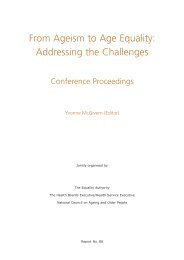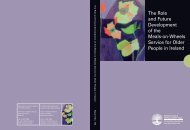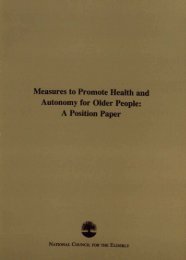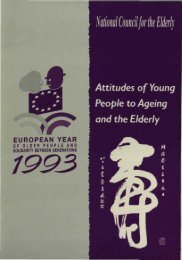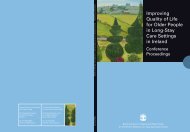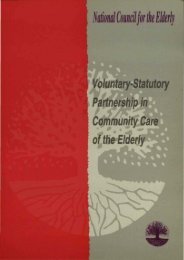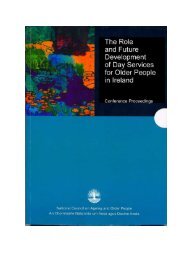Improving Quality of Life for Older People in Long-Stay Care ...
Improving Quality of Life for Older People in Long-Stay Care ...
Improving Quality of Life for Older People in Long-Stay Care ...
- No tags were found...
You also want an ePaper? Increase the reach of your titles
YUMPU automatically turns print PDFs into web optimized ePapers that Google loves.
Human needs may also provide part <strong>of</strong> the foundation <strong>for</strong> quality <strong>of</strong> life and thiscan be an important <strong>in</strong>fluence on the theory and practice <strong>of</strong> measurement (Bowl<strong>in</strong>g,2004; Raphael, 1996; Sirgy, 1986; Browne et al., 1997). A.H. Maslow’s A Theory<strong>of</strong> Human Motivation (1970) outl<strong>in</strong>es a needs-based approach to measur<strong>in</strong>g quality<strong>of</strong> life that adopts a hierarchical stance. At the bottom <strong>of</strong> the hierarchy are basicneeds which are physiological, followed by safety and security needs. These needsare deemed to be essential <strong>for</strong> human survival and it is not until they have beenfully satisfied that an <strong>in</strong>dividual will seek to fulfil higher level needs. When thephysiological and safety needs have been gratified, then love, affection andbelong<strong>in</strong>gness needs will emerge. These <strong>in</strong>clude the need <strong>for</strong> affectionaterelationships, <strong>for</strong> example with family and friends. When this need is satisfied,the <strong>in</strong>dividual will strive to fulfil esteem needs which <strong>in</strong>clude a feel<strong>in</strong>g <strong>of</strong> selfrespectand self-confidence and the ga<strong>in</strong><strong>in</strong>g <strong>of</strong> the respect <strong>of</strong> others. F<strong>in</strong>ally,Maslow ma<strong>in</strong>ta<strong>in</strong>s that even if all <strong>of</strong> these are met, an <strong>in</strong>dividual will not be atpeace until they have fulfilled the need <strong>for</strong> self-actualisation, i.e. ‘the <strong>in</strong>dividualis do<strong>in</strong>g what h/she, <strong>in</strong>dividually, is fitted <strong>for</strong>’ (Maslow, 1970). In other words,the <strong>in</strong>dividual must be able to realise and express his full potential, whateverthe circumstances; what Sen (1993) might describe as maximis<strong>in</strong>g capabilities.The consideration <strong>of</strong> quality <strong>of</strong> life <strong>in</strong> terms <strong>of</strong> human needs provides a usefulframework <strong>for</strong> understand<strong>in</strong>g the <strong>in</strong>terplay <strong>of</strong> objective and subjective components<strong>of</strong> quality <strong>of</strong> life and why people’s perceptions <strong>of</strong> quality <strong>of</strong> life may change overtime. Bowl<strong>in</strong>g (2004) believes that the objective approach to measur<strong>in</strong>g quality<strong>of</strong> life is fundamentally a needs-based approach (which assumes that <strong>in</strong>dividualshave basic needs) and the satisfaction <strong>of</strong> these needs determ<strong>in</strong>es an <strong>in</strong>dividual’swell-be<strong>in</strong>g. There<strong>for</strong>e, as a society becomes more affluent and basic needs (e.g.physiological, com<strong>for</strong>t, safety and security) are met, subjective <strong>in</strong>dicators <strong>of</strong> quality<strong>of</strong> life may grow <strong>in</strong> importance (Gentile, 2001). There<strong>for</strong>e, quality <strong>of</strong> life may bemore accurately measured or def<strong>in</strong>ed as an <strong>in</strong>dividual’s evaluation <strong>of</strong> their perceivedwell-be<strong>in</strong>g or satisfaction with life.693.4 Assess<strong>in</strong>g <strong>Quality</strong> <strong>of</strong> <strong>Life</strong> <strong>for</strong> <strong>People</strong> with DementiaA particular challenge arises <strong>in</strong> the measurement <strong>of</strong> the quality <strong>of</strong> life <strong>of</strong> people withdementia. Any framework adopted <strong>for</strong> measur<strong>in</strong>g the quality <strong>of</strong> life <strong>of</strong> residents musttake account <strong>of</strong> the needs and limitations <strong>of</strong> people suffer<strong>in</strong>g from dementia(Lawton, 2001). It is <strong>of</strong>ten assumed that dementia patients are <strong>in</strong>capable <strong>of</strong>







